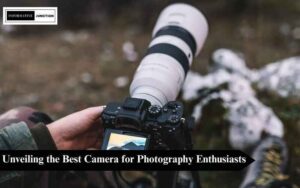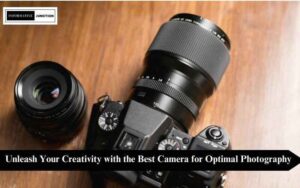For those taking their first steps into the captivating realm of photography, choosing the right gear is pivotal. The best camera for beginners not only captures moments but also becomes a trusted companion on the journey of self-expression and creativity. In this guide, we unravel the world of entry-level cameras, providing insights to empower aspiring photographers.
Read More Informative Blogs on Informative Junction
Understanding the Needs of Beginners in Photography
Photography is an art form that invites individuals to explore their creativity and capture the essence of the world around them. For beginners, the initial choice of a camera is crucial in shaping their photography experience. Several factors come into play when determining the best camera for beginners.
Key Features to Consider in a Beginner-Friendly Camera
1. Ease of Use and User-Friendly Interface
For beginners, simplicity is key. A camera with an intuitive user interface, easy-to-navigate menu system, and straightforward controls ensures a smoother learning curve and a more enjoyable experience.
2. Versatility in Shooting Modes
The best cameras for beginners offer a variety of shooting modes, including automatic settings for quick snaps and manual modes for those looking to delve into the intricacies of photography. This versatility accommodates different skill levels and shooting scenarios.
3. Compact and Lightweight Design
Portability is often a priority for beginners. Cameras with a compact and lightweight design are not only easy to carry but also encourage users to take their camera everywhere, ready to capture spontaneous moments.
4. Quality Image Sensor
While entry-level, the camera’s image sensor plays a crucial role in image quality. Look for a camera with a decent-sized sensor that delivers sharp and vibrant images, even in challenging lighting conditions.
Top Picks: Best Cameras for Beginners in 2023
1. Canon EOS Rebel T8i
The Canon EOS Rebel T8i is an excellent choice for beginners seeking a versatile camera. With a 24.1MP sensor, 4K video recording, and a vari-angle touchscreen, it offers a perfect blend of performance and user-friendly features.
2. Nikon D3500
Renowned for its user-friendly design, the Nikon D3500 is a compact and lightweight DSLR that excels in simplicity. With a 24.2MP sensor, impressive battery life, and a guide mode for beginners, it’s an ideal entry-level camera.
3. Sony Alpha a6000
For those venturing into mirrorless cameras, the Sony Alpha a6000 is a standout choice. Boasting a 24.3MP sensor, fast autofocus, and a compact design, it delivers impressive image quality in a portable package.
4. Fujifilm X-T200
Fujifilm’s X-T200 combines a sleek design with powerful features. With a 24.2MP APS-C sensor, 4K video capabilities, and a user-friendly interface, it’s a stylish yet functional option for beginners.
Essential Accessories for Beginner Photographers
1. Tripod for Stability
A stable shot is often crucial, especially for beginners still mastering the art of holding a camera steady. A tripod provides stability, allowing for sharper images, particularly in low-light conditions.
2. Carry Case for Protection
Protecting your camera from dust, scratches, and minor bumps is essential. Invest in a quality carry case to keep your camera safe during travel and outdoor shoots.
3. Additional Lenses for Creativity
As you progress in your photography journey, experimenting with different lenses adds versatility to your shots. Consider investing in prime lenses or zoom lenses to explore various perspectives.
4. External Flash for Low-Light Situations
An external flash comes in handy when natural light is insufficient. It allows you to illuminate subjects effectively, especially in indoor or low-light environments.
Tips for Maximizing Your Beginner-Friendly Camera
1. Explore Different Shooting Modes
Take advantage of the various shooting modes your camera offers. Experiment with aperture priority, shutter priority, and manual mode to understand their impact on your photos.
2. Master the Basics of Composition
Understanding composition is fundamental to creating visually appealing images. Learn about the rule of thirds, leading lines, and framing to enhance the impact of your photographs.
3. Practice Regularly and Experiment
The more you use your camera, the more comfortable you become with its features. Regular practice allows you to explore different settings, understand your camera’s capabilities, and refine your photography skills.
4. Seek Inspiration and Learn from Others
Photography is an evolving art form, and learning from others is invaluable. Explore the work of experienced photographers, join online communities, and participate in photography forums to gain insights and inspiration.
Conclusion
Selecting the best camera for beginners marks the beginning of a thrilling journey into the world of photography. Whether you opt for a DSLR or a mirrorless camera, the key is to choose a camera that aligns with your needs and sparks your passion for capturing moments. As you explore the features, accessories, and tips outlined in this guide, remember that every shot is an opportunity to express your unique perspective. Embrace the learning process, unleash your creativity, and let your photography journey unfold with the perfect camera by your side.




